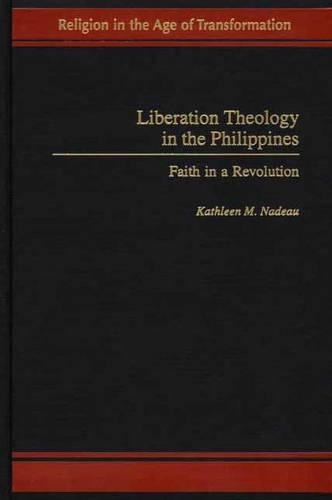
Liberation Theology in the Philippines: Faith in a Revolution
(Hardback)
Publishing Details
Liberation Theology in the Philippines: Faith in a Revolution
By (Author) Kathleen Nadeau
Bloomsbury Publishing PLC
Praeger Publishers Inc
30th October 2001
United States
Classifications
Tertiary Education
Non Fiction
Theology
Religious social and pastoral thought and activity
Development studies
Social and ethical issues
261.809599
Physical Properties
Hardback
160
Description
Liberation Theology in the Philippines: Faith in a Revolution studies the interrelationship of international development policies and local social and economic structures in the Philippines. This ethnography demonstrates that the application of conventional development paradigms to the situation overlooks the human suffering and displacement experienced by the people for whom the policies are supposed to help. By contrast, the Basic Ecclesial Community (BEC) movement offers an alternative strategy for development that aims to build a more just and community-oriented society, while promoting sustainable development. The study begins with an historical analysis of the relationship between liberation theology, the Catholic Church, and the nationalist struggle. The remaining chapters look at the real experiences of people living and working in the BECs, as they struggle against some of the negative impacts of traditional approaches to development. In addition, the author illustrates how BECs can fail when environmental and social factors clash with a community's attempts at development, and highlights the theology and religious aspects of the BEC movement. This unique contribution to the study of liberation theology and development will be of interest to scholars, students, and professionals working with development agencies and religious organizations.
Reviews
[b]rings a fresh and interesting focus back to the topic...[N]adeau brings theoretical and theological abstractions...[r]eadable book...[n]icely summearize the basic elements of the Spanish and American colonial regimes...For anyone teaching liberation theology, this book would provide a wonderful counterpart to more abstract systematics while, the setting of the Philippines (as opposed to the more common case of Latin America) would enable students to better distinguish the economic, cultural, ecclesial, and political strands.-Journal of Church and State
[t]his volume presents interesting field data that illustrate both similarities and contrasts with liberation theology in Latin America.-Religious Studies
Frances S. Adeney's book is interesting and informative-Journal of Church and State
"brings a fresh and interesting focus back to the topic...Nadeau brings theoretical and theological abstractions...readable book...nicely summearize the basic elements of the Spanish and American colonial regimes...For anyone teaching liberation theology, this book would provide a wonderful counterpart to more abstract systematics while, the setting of the Philippines (as opposed to the more common case of Latin America) would enable students to better distinguish the economic, cultural, ecclesial, and political strands."-Journal of Church and State
"this volume presents interesting field data that illustrate both similarities and contrasts with liberation theology in Latin America."-Religious Studies
"[t]his volume presents interesting field data that illustrate both similarities and contrasts with liberation theology in Latin America."-Religious Studies
"Frances S. Adeney's book is interesting and informative"-Journal of Church and State
"[b]rings a fresh and interesting focus back to the topic...[N]adeau brings theoretical and theological abstractions...[r]eadable book...[n]icely summearize the basic elements of the Spanish and American colonial regimes...For anyone teaching liberation theology, this book would provide a wonderful counterpart to more abstract systematics while, the setting of the Philippines (as opposed to the more common case of Latin America) would enable students to better distinguish the economic, cultural, ecclesial, and political strands."-Journal of Church and State
Author Bio
Kathleen M. Nadeau is an assistant professor and applied anthropology coordinator at California State University in San Bernardino. She earned her Ph.D. in anthropology at Arizona State University
